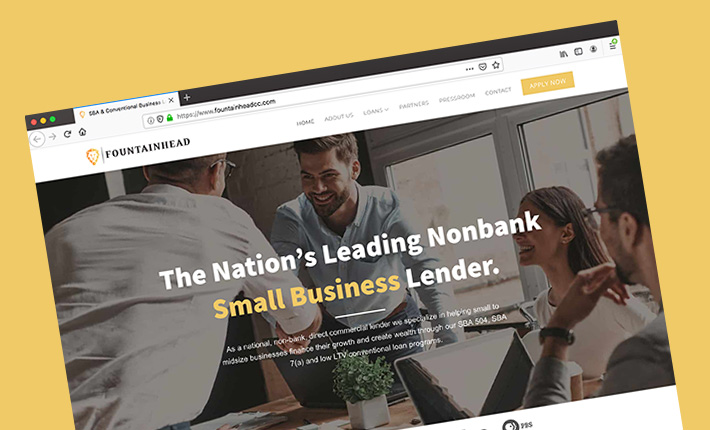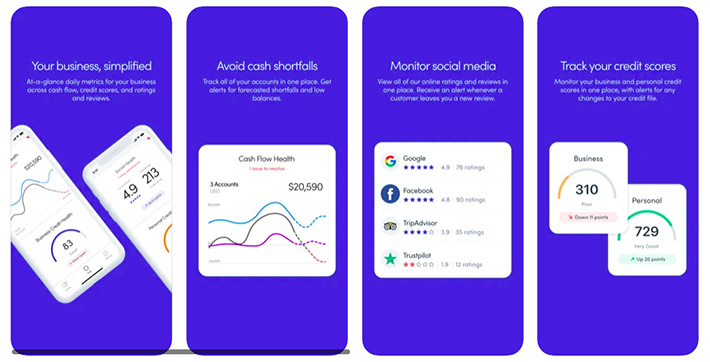Business Lending
Missouri Introduces Commercial Financing Disclosure Bill
January 25, 2022Add Missouri to the list of states proposing mandatory disclosures in commercial financing transactions.
[See: New York, California, New Jersey, Virginia, North Carolina]
Missouri’s SB 963 is different from bills in other states in that it does not seek the disclosure of an annual percentage rate. Adopting a simpler approach, SB 963 would require commercial financing companies to disclose:
1. The total amount of funds provided
2. The total amount of funds disbursed
3. The total amount to be paid
4. The total dollar cost
5. The manner, frequency, and amount of each payment
6. Prepayment costs or discounts
7. Whether or not a broker will be compensated
The bill was introduced by State Senator Justin Brown (R).
Fountainhead Hires Former SBA District Director as SVP
January 21, 2022S mall business lender Fountainhead has hired former US Airforce Veteran and SBA District Director Joseph Amato as their new Senior Vice President. Amato served for four years as the District Director of the SBA’s Nevada District Office prior to taking his new position at FountainHead.
mall business lender Fountainhead has hired former US Airforce Veteran and SBA District Director Joseph Amato as their new Senior Vice President. Amato served for four years as the District Director of the SBA’s Nevada District Office prior to taking his new position at FountainHead.
“Joe’s strong work ethic and extensive knowledge base will be an invaluable asset to Fountainhead, as we build on our past success as the largest nonbank SBA lender in the Southeast and execute our nationwide growth strategy,” said Fountainhead CEO and Founder Chris Hurn.
Amato assisted Nevada’s SBA program in the implementation of stimulus programs that helped keep many Nevadan businesses afloat during pandemic-induced lockdowns. Many of these stimulus programs have been credited to keeping places alive, like the businesses on the Las Vegas strip, for example.
“I’m eager to leverage my experience with the SBA and beyond to help Fountainhead drive financing opportunities and support to millions of small businesses across America,” said Amato.
Kabbage Co-founder Rob Frohwein Steps Down from the Company
January 6, 2022 Rob Frohwein, who served as the CEO of Kabbage for more than a decade, has left the company. A post he published on social media revealed that his last day was December 17th.
Rob Frohwein, who served as the CEO of Kabbage for more than a decade, has left the company. A post he published on social media revealed that his last day was December 17th.
“I didn’t make a big deal – the company has always been about our customers & our employees – and never about any person,” Frohwein said about the quiet exit.
The move is not altogether unsurprising. American Express acquired Kabbage in August 2020 after covid heavily disrupted its small business financing business. Amex first reintroduced Kabbage as a checking account brand and only just recently resurrected its funding operations.
That re-emergence was the catalyst to move, according to Frohwein.
“Why now? Lots of blah blah blahs but it’s the right time,” he wrote. “We’ve relaunched our products with Amex. Now, it’s time to fully devote myself to being an entrepreneur once again.”
Frohwein has kept busy on the side as an advisor & investor in SentiLink, the vice chair of StimLabs, and the CEO of Drum Technologies, Inc, according to his profile, but he apparently has even more plans in the works.
“So what now? Well, I’m pretty excited for what is next. Keep a lookout!”
The benign salutation may actually be a nod to what his next venture is. We’ll see…
New York’s Commercial Financing Disclosure Law to Undergo Further Comment and Review
January 4, 2022 Implementation of the New York Commercial Financing Disclosure law originally intended to go into effect four days ago, is now subject to another delay on top of the existing one, with no official date on when compliance will be required.
Implementation of the New York Commercial Financing Disclosure law originally intended to go into effect four days ago, is now subject to another delay on top of the existing one, with no official date on when compliance will be required.
Seeing as the New York Department of Financial Services (DFS) was still accepting comments on the proposed regulation through December 20th, DFS had originally granted covered companies a six-month reprieve on compliance. But after having reviewed the comments, DFS determined that it’s actually back to the drawing board on a regulatory proposal. Sometime “early in the new year,” DFS said, it will publish a revised proposal for further public comment.
“Given the complexity of the disclosures required by the CDFL (Commercial Financing Disclosure Law), we believe the Legislature intended that the Department first provide regulatory guidance regarding the standardized disclosures required to be provided under the CDFL,” said Serwat Farooq, a Deputy Superintendent at DFS, in a published statement. “Waiting to commence CDFL obligations until implementing regulations are in place will ensure that the disclosures are made in a consistent, standardized fashion. This will help businesses understand the terms and conditions of the various forms of credit being offered to them, the very intent of the CDFL.”
Five Things Small Business Financing Should Look out for in 2022
January 3, 2022 With another year in the books, below is a list of things that the small business finance community should think about in 2022.
With another year in the books, below is a list of things that the small business finance community should think about in 2022.
Disclosure Laws are Coming
The laws in New York are changing. While the date for the new law was pushed back at least until June, the state is about to make it very difficult to finance small businesses. California, New Jersey, Maryland, Connecticut, and North Carolina are among other states to also keep an eye on regarding disclosures in 2022.
Blockchains, Blockchains, Blockchains
Regardless of the legitimacy of things like cryptocurrencies and NFTs, blockchain technology is on its way to the initial states of implementation in the financial world. In a further effort to eliminate paperwork, redundancy, and time, the idea of a decentralized ledger has all corners of the financial world watching closely.
Merchants are Becoming Digitally Native
As business owners are continuing to emerge as younger and more technologically sound, lenders should embrace fintech in any area of their processes that they can. Just to appear as a tech company may become a marketing strategy for some brokers or lenders, as those who offer the smoothest, simplest, and most technological form of funding will win over their competition with this new emerging business owner.
Brokers Using Motivational Social Media Posts to Develop Brands
As small business financiers continue to try and find their place on social media, there seems to be a gathering of those in the broker space to create motivational content. Keep a lookout for more brokers to continue internet marketing via motivational posts to not only give a face to their company, but legitimize themselves as a go-to in the space; so maybe they can launch some type of broker training program in the future.
Networking Will Continue to Re-Emerge as Top Tool
As 2021 concluded with in-person events slowly approaching normalcy after pandemic induced restrictions, the industry is showing an unprecedented amount of desire to get together multiple times a year to build their books of business. Look for events across finance, technology, and cryptocurrency spaces to increase in both numbers and attendees.
Nuula, Still in the Business Lending Game, Lays Groundwork for Larger Ecosystem
December 29, 2021 Nuula, formerly known as BFS Capital, has 5,000 merchants on a waitlist to access a line of credit after just four months of its application process being made available.
Nuula, formerly known as BFS Capital, has 5,000 merchants on a waitlist to access a line of credit after just four months of its application process being made available.
But there’s more.
“Nuula is built to not only deliver our own financial products, but it’s developed to help us provision and deploy third party financial products that come from our ecosystem,” said Mark Ruddock, Nuula’s CEO. “So what we’re trying to do here is not really be a broker, but we will carefully curate products.”
“That could be larger, longer loans from one partner, it could be insurance from another partner, it could be entrepreneur wealth management from a third partner,” he continued.
“So we bring those partners onto the platform, and then we expose their functionality within the app, in a way that’s consistent with all the other tools in the app. So yes, there is room for third party lenders.”
Ruddock spoke about how as of now, Nuula’s infrastructure only offers opportunities to those interested in directly funding businesses. The company profits via revenue sharing when businesses are provided with capital from a third party funder on the platform.
Despite not being available yet, he hinted at possibly incorporating broker-esque products as the app’s financial product suite grows.
“Today, we don’t see a near term role for brokers on the app, because we’re not really trying to create a marketplace of a multitude of products, we’re really trying to curate things very, very carefully,” said Ruddock. “However that’s not to say say that we will not over time provide the ability for the more digital brokers or intermediaries to play a role as we seek to broaden the portfolio of tools that we offer.”
“I would say no to brokers in the sense that we really don’t have a compelling offer for them at the moment, but yes to other financial services providers.”
Ruddock described how Nuula is serving a niche customer base, a tech-centric merchant who is looking for an easy-to-use mobile software that can manage their businesses’ X’s and O’s. Not only is this type of merchant underserved and beginning to substantiate in numbers according to Ruddock, but they are extremely eager for access to capital.
“It’s a fundamental change in the way underwriting has been done, away from kind of a rearward looking model, towards a real-time forward looking model, and that’s what we believe is going to be required to unlock capital to this new generation of businesses.”
“[Nuula] reimagines underwriting in a way that says ‘don’t just look at the last six months of bank statements’,” Ruddock said. “[We] look on not only of the day of lending, but the lifetime of your relationship, and how those businesses are recovering, growing, and thriving.”
He spoke about how with real-time data being accessible through Nuula, businesses that are building their creditworthiness can have a mobile reference point for the data that they need to see their real-time financial state, while simultaneously giving lenders a live picture of the businesses’ books.
“So even if a business is not strong enough for credit today, it might be in three months, and we can go watch your progression through this period and unlock the capital when the time is right, and then if that business grows out of the pandemic and recovers and is stronger, we’re going to be able to a broader and richer portfolio of credit.”
Although their target customer seems to be a digitally native merchant, Ruddock says that Nuula’s onboarding process is designed to be simple enough for a merchant who may not be as familiar with fintech.
“I’m a fifty-plus year-old CEO of a fintech company, and I would say I’m as digitally savvy as a twenty year-old, so it isn’t really about age anymore,” said Ruddock. “It’s by the way which [merchants] have embraced technology.”
“What we’ve done with Nuula is we’ve tried to make this product intuitive and simple for a first time app user and we’ve tried to help these folks get access to the data that now is sitting in a multitude of systems. While we believe people who have grown up in an app-centric world are going to be amongst the first adopters, we’re trying to make this product accessible for the fifty year-old restaurant owner too.”
Nuula plans on expanding their data harnessing tools with other fintechs early next year. “Over the next two weeks, we will actually unlock the ability for [merchant] sales data from Shopify or Square,” said Ruddock.
Transition to NMLS Extension Postponed to March 15, 2022
December 21, 2021With permission for reprint from Leasing News and credit to Ken Greene
 The California DFPI has extended the deadline for transitioning to the NMLS to March 15, 2022 for all those with a California license.
The California DFPI has extended the deadline for transitioning to the NMLS to March 15, 2022 for all those with a California license.
I had a long talk with the DFPI NMLS specialist and the agency is well aware that the transition process is not simple, and that many companies are having difficulty with it. I was also advised that if an application is pending but not approved when the deadline passes, your license will not be revoked. That is also good news.
This three-month extension should give everyone sufficient time to get the transition done. The process is confusing, but the folks at the DFPI are quite helpful. I urge anyone having difficulty to call them. Still, don’t wait until the last minute!
Here is the announcement:
Extension – NMLS Transition for California Financing Law Licensees: Deadline Extended to March 15, 2022
Notice of Extension
The deadline for licensees under the California Financing Law not currently on NMLS to transition onto NMLS is extended to March 15, 2022.
All licensees not yet on NMLS must establish an account in NMLS and submit their information through NMLS on or before the March 15, 2022 deadline.
Begin by Establishing an Account in NMLS
Licensees seeking to transition onto NMLS may access NMLS’s website here. From this homepage, select the button for “Getting Started – Company.”
To facilitate creating an account in NMLS, all transitioning CFL licensees should be familiar with the documentation required when setting up the account. This NMLS Account Creation Help Document describes step-by-step how to create an NMLS account and the documents needed.
Input Licensee Information
After establishing an account, a licensee must input its information on two electronic forms (three electronic forms if the licensee has branch locations). Information about the licensee is entered on the “Company Form,” MU1. Information about each key personnel (owners, officers, directors, managing members, partners, etc.) is entered on the “Individual Form,” MU2. Information about branch locations/licenses is entered on the “Branch Form,” MU3. After completing the applicable information, submit the information through NMLS.
NMLS has state-specific checklists to assist licensees transitioning onto NMLS, and FAQs for guidance on transitioning a license onto NMLS.
Questions
For questions regarding the creation of an account in NMLS, contact the NMLS Call Center at (855) 665-7123. For questions regarding transitioning a CFL license onto NMLS, contact DFPI at CFL.Inquiries@dfpi.ca.gov or (866) 275-2677.
Finally, for those of you who missed it, here is a link to my Leasing News article from 12/8/21 outlining the CFL to NMLS transition process:
https://leasingnews.org/archives/Nov2021/11_15.htm#cfl
Ken Greene Leasing & Finance Observations
https://leasingnews.org/Pages/greene_observations.html
Ken Greene
Tel: 818.575.9095
Fax: 805.435.7464
ken@kengreenelaw.com
Alternate: kengreenelaw@outlook.com
EIDL Applicants Still Waiting for Funds as Deadline Approaches
December 16, 2021 There is a major pileup of applicants waiting to hear back from the SBA regarding EIDL applications, according to Iron Capital Equities, a fintech firm who owns websites that help businesses through the EIDL application process. According to a press release by the company, many applicants who have not yet received funding seem to believe they’ve been ghosted by the SBA.
There is a major pileup of applicants waiting to hear back from the SBA regarding EIDL applications, according to Iron Capital Equities, a fintech firm who owns websites that help businesses through the EIDL application process. According to a press release by the company, many applicants who have not yet received funding seem to believe they’ve been ghosted by the SBA.
The EIDL deadline to file an application is December 31.
“90% (9 out of 10) of our 400 client applicants are still in limbo, with no update regarding the status of the funds,” states co-founder Matthew Elling. “The short-term economic outlook from small businesses is dim, so these funds are highly sought after.”
Elling insisted that he is in constant contact with his customers, and says his company is doing everything they can to service these clients who are playing the waiting game.
“Even though we are a financial technology company, we still ‘talk’ with our customers,” Elling continued. “We understand their struggles in a post COVID economic environment, we have provided them with advice on the SBA assistance like EIDL and the two PPP rounds for payroll and business expense assistance during and after the government-imposed lockdowns.”
EIDL loans were a beacon of hope for many businesses struggling to survive in the pandemic. This type of government funding isn’t a grant, and needs to be paid back by the merchant at a term of 30 years at 3.75% annual interest.





























